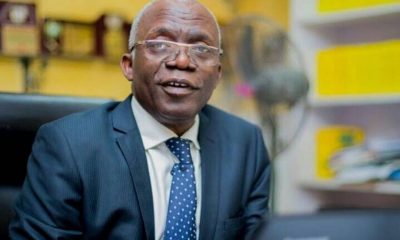Business
CBN introduces stricter measures for BDCs, imposes N2bn licence fee

CBN introduces stricter measures for BDCs, imposes N2bn licence fee
Amidst the ongoing forex crisis in Nigeria, the Central Bank of Nigeria (CBN) has implemented stringent measures targeting Bureau De Change (BDC) operators to address the deteriorating economic situation.
The country faces severe economic challenges, with the naira plunging to an all-time low of N2,000 against the dollar. In response, the National Security Adviser, Mallam Nuhu Ribadu, has directed law enforcement agencies, including the Economic and Financial Crimes Commission (EFCC) and the Department of State Services (DSS), to clamp down on currency speculators operating in the forex market. This directive has led to nationwide raids on BDCs and the arrest of illegal operators.
On Friday, the CBN’s Financial Policy and Regulation Department issued a new set of guidelines for BDC operators and stakeholders in the financial sector. Among the key provisions are:
- License Requirements: BDCs in Tier 1 must have a capital base of N2 billion, while Tier 2 BDCs must maintain a capital base of N500 million.
- Ownership Restrictions: Entities such as banks, government agencies, and NGOs are prohibited from holding ownership stakes in BDCs.
- Permissible Activities: BDCs are authorized to buy and sell foreign currencies, issue prepaid cards, and serve as cash points for money transfer operators. However, they are prohibited from accepting deposits, granting loans, dealing in gold, or engaging in capital market activities.
READ ALSO:
- House of Reps’ legislative banditry against universities – Farooq Kperogi
- CBN to Customs: Adopt official forex rate for import duty
- Naira sells N1,770/$ at parallel market, 1,665/$ official window
- Foreign Currency Sourcing: BDCs can source forex from authorized dealers, travellers, hotels, embassies, etc. Transactions exceeding $10,000 require a declaration of the source.
- Sale of Foreign Currencies: BDCs can sell forex for travel, medical bills, school fees, etc., within specified limits per customer annually. At least 75% of sales must be via transfer, with the remaining 25% allowed in cash.
- Operational Standards: BDCs must adhere to customer verification procedures, maintain transaction records, connect to CBN systems, and display exchange rates clearly, among other requirements.
- Supervision and Compliance: BDCs are mandated to submit specified regulatory returns, maintain accessible records for inspection, and ensure compliance with the established guidelines.
- Franchising and Prudential Requirements: Tier 1 BDCs appointing franchises must adhere to specified standards regarding policy, monitoring, and branding, while all BDCs must comply with prudential requirements on open positions, fixed assets, borrowings, dividend payments, etc.
- AML/CFT Compliance: BDCs must comply with Anti-Money Laundering (AML) and Counter Financing of Terrorism (CFT) regulations, including implementing policies, monitoring activities, and reporting suspicious transactions.
These measures represent a concerted effort by the CBN to regulate and stabilize the forex market while ensuring transparency and accountability among BDC operators.
CBN introduces stricter measures for BDCs, imposes N2bn licence fee
Business
Nigeria’s debt service ratio drops from 97% to 68% – Finance minister

Nigeria’s debt service ratio drops from 97% to 68% – Finance minister
Nigeria’s Finance and Coordinating Minister of the Economy, Wale Edun, on Thursday, reported a dramatic drop in the debt service ratio from an alarming 97 per cent in June 2023 to a more sustainable 68 per cent in 2024.
Addressing a press conference on the economy’s half year performance in Abuja, Edun asserted that the reduction allows the government to redirect funds to essential sectors such as infrastructure, education, healthcare, and social services, thereby improving credibility with investors and international financial institutions.
The Minister also noted a decline in Nigeria’s total debt, both domestic and foreign dollar-denominated debt fell from $181 million to $98 million, attributed to timely payments to contractors and the government’s exit from the Ways and Means financing scheme.
He added that the Federal Government’s economic policies over the past year have started yielding positive outcomes.
Edun highlighted an extraordinary 30 per cent growth in non-oil income, surpassing last year’s performance and exceeding budget expectations for the first half of 2024. He emphasized the government’s commitment to diversifying revenue sources beyond oil through robust tax reforms aimed at doubling government revenue as a percentage of GDP, from approximately 14-15 per cent to around 25 per cent.
He outlined strong measures to improve revenue collection, including technological advancements and process optimization within revenue-generating agencies. While oil revenue remains significant, its share of gross revenue has decreased to 30 per cent, down from 41 per cent during the same period last year.
READ ALSO:
- DSS recovers 2,000 bags of government-donated rice in Kastina
- DSS: There are plans to use mass protest for govt change
- INEC uncovers plan to disrupt Edo elections using ESSN operatives
To attract investments from Nigerians abroad, the Minister revealed that plans were afoot to issue a $500 million bond within the next four weeks.
The initiative aims to encourage diaspora Nigerians to bring their funds back home for investment, contributing to economic growth.
Edun acknowledged the hardships faced by Nigerians due to reform policies but assured that the benefits of these reforms will soon be realized. He stressed that President Tinubu prioritizes reducing food prices across the country and is deeply concerned about the welfare of ordinary Nigerians. After resolving transparency issues, the Cash Transfer Programme within the Social Investment initiative has resumed, recently covering approximately 600,000 beneficiaries.
He presented evidence of the economy turning a positive corner and noted that macroeconomic stability was becoming evident, with stable exchange rates, a reducing budget deficit, and a positive trade balance.
He added that investment flows are also positive, and there has been a comprehensive reconfiguration of federal finances to boost revenue and control expenditure.
Despite global economic challenges, Nigeria’s economy grew faster in the first quarter of 2024 compared to 2023. The growth was broad-based, spanning agriculture, industries, and services. Agricultural growth, which was negative in the first quarter of 2023, showed modest growth in the first quarter of 2024. The industrial sector grew seven times faster than in Q1 2023.
Edun noted that while inflation persists, the annual growth rate of inflation is slowing. Although there was a slight uptick in June due to seasonal factors, the overall trend indicates progress towards reduced inflation.
Edun concluded by expressing satisfaction with the well-coordinated fiscal and monetary policies, which are beginning to bear fruit. He emphasized that these policies are paving the way for sustained economic growth and stability, ultimately benefiting all Nigerians.
Nigeria’s debt service ratio drops from 97% to 68% – Finance minister
Business
Meta cracks down on ‘Yahoo Boys’, deletes 63,000 accounts

Meta cracks down on ‘Yahoo Boys’, deletes 63,000 accounts
Meta Platforms Inc., the parent company of Facebook, Instagram, and WhatsApp, has removed 63,000 accounts associated with the notorious “Yahoo Boys” scam group, the company announced in its Q1 2024 Adversarial Threat Report on Wednesday.
The accounts, deleted over the past few weeks, were used for financial sextortion scams and distributing blackmail scripts. Meta reported that a smaller network of 2,500 accounts, linked to around 20 individuals, primarily targeted adult men in the United States using fake identities.
Meta said it identified and disabled these accounts through a combination of advanced technical signals and comprehensive investigations, enhancing its automated detection systems.
“Financial sextortion is a borderless crime, fueled in recent years by the increased activity of Yahoo Boys, loosely organised cybercriminals operating largely out of Nigeria that specialize in different types of scams,” the social media giant stated.
It added, “We’ve removed around 63,000 accounts in Nigeria attempting to target people with financial sextortion scams, including a coordinated network of around 2,500 accounts.”
“We’ve also removed a set of Facebook accounts, Pages, and groups run by Yahoo Boys—banned under our Dangerous Organizations and Individuals policy—that were attempting to organize, recruit and train new scammers,” the company explained.
READ ALSO:
- Tinubu welcomes ex-Senate President Anyim into APC
- Customs seize vehicles illegally taking large amount of fuel to Cameroon
- Illegal petroleum storage facility discovered in Lagos
During the investigation, Meta said it found that most scammers’ attempts were unsuccessful, though some had targeted minors. These cases were reported to the National Center for Missing and Exploited Children.
Meta revealed that it also shared information with other tech companies via the Tech Coalition’s Lantern program to help curb these scams across platforms.
Further, the parent company of Facebook said it removed around 7,200 assets in Nigeria, including 1,300 Facebook accounts, 200 pages, and 5,700 groups that were providing scam-related resources.
These assets were found offering scripts and guides for scams and sharing links to collections of photos for creating fake accounts, it expounded.
Since this disruption, Meta’s systems have been actively blocking attempts from these groups to return, continually improving their detection capabilities.
The company noted that it has also been working closely with law enforcement, supporting investigations and prosecutions by responding to legal requests and alerting authorities to imminent threats.
The social media giant stated that its efforts extend beyond account removal.
“We also fund and support NCMEC and the International Justice Mission to run Project Boost, a program that trains law enforcement agencies around the world in processing and acting on NCMEC reports.
Meta cracks down on ‘Yahoo Boys’, deletes 63,000 accounts
Business
We increased interest rates 26.75% to stem inflation – Cardoso

We increased interest rates 26.75% to stem inflation – Cardoso
In response to mounting public frustration over Nigeria’s economic challenges the Central Bank of Nigeria’s (CBN) Governor, Yemi Cardoso, to insufficient diversification, has attributed the horror to insufficient diversification efforts, excess liquidity, and global economic pressure.
He stated this yesterday at a media briefing to mark the conclusion of the Monetary Policy Committee (MPC)’s 296th meeting in Abuja.
According to him, the MPC increased interest rates by 50 basis points from 26.25 per cent to 26.75 per cent in an effort to manage inflation.
The apex bank adjusted the asymmetric corridor from +100/-300 to +500/-100 basis points, Cash Reserve Ratio (CRR) of deposit money banks at 45 per cent and merchant banks at 14 per cent while retaining Liquidity Ratio at 30 per cent.
Justifying the decisions, Cardoso explained that the MPC acknowledged the detrimental impact of rising prices on households and businesses across Nigeria and reiterated its commitment to maintaining price stability,
He expressed optimism that recent monetary policy measures, coupled with fiscal interventions aimed at addressing food inflation, would help stabilise prices in the near term.
Cardoso highlighted the persistent challenge of food inflation, which is worsened by insecurity in key agricultural areas and high transportation costs, and emphasised the urgent need to enhance food supply within Nigeria.
READ ALSO:
- Nigerians have right to protest, Amnesty International tells FG
- Police arrest fleeing killer of Brigadier General in Abuja, recover pistol
- Republican lawmaker hits Kamala Harris with articles of impeachment
He said: “It was observed that while monetary policy has been moderating aggregate demand, rising food and energy costs continue to exert upward pressure on price development. The prevailing insecurity in food producing areas and high cost of transportation of farm produce are also contributing to this trend. Members were therefore not oblivious to the urgent benefit of addressing these challenges as it will offer a sustainable solution to the persistent pressure on food prices.
“Also noted in its consideration is the increasing activities of middlemen who often finance smallholder farmers, aggregate, hoard and move farm produce across the border to neighboring countries. The committee suggested the need to put in check such activities in order to address the food supply deficit in the Nigerian market to moderate food prices.
The MPC therefore resolved to sustain collaboration with the fiscal authority to ensure that inflationary pressure is subdued.
Reacting, Nigeria’s first professor of the capital markets Prof Uche Uwaleke said: “Having done 750 basis points between February and May this year, I had predicted they would do a minimum of 50bps or a max of 100bps in July.
“I am glad to note that they chose the floor which is a sign that a complete halt is most likely in their next scheduled meeting in September.
But the adjustment to the asymmetric corridor around the MPR is a major source of concern for me.
“The MPC communique did not provide any explanation for increasing the SLR from +100 to +500 and the SDR from -300 to -100.
“By implication, with an MPR of 26.75 per cent, banks will now get loans from the CBN at 31.75 per cent while they will be remunerated for their excess deposits at 25.75 per cent. This will further squeeze liquidity from the banking system and jerk up cost of credit with adverse consequences on output and the equities market.
“The MPC communique should have made it clear why it was better to mask the tightening in the asymmetric corridor than reveal it in the MPR.
“May I observe that unlike previous MPC communiques, recent ones are silent regarding how the members voted. This information is useful at this stage even before their personal statements are published.
“I submit that as far as taming the current elevated inflation in Nigeria is concerned in view of its major non-monetary drivers, the fiscal side holds the ace”, he said.
We increased interest rates 26.75% to stem inflation – Cardoso
-

 News2 days ago
News2 days agoNLC can’t withdraw from protest it didn’t organise – Ajaero
-

 International9 hours ago
International9 hours agoNetanyahu, Biden hold talks over tense Gaza ceasefire
-

 News2 days ago
News2 days agoNorthern group attacks Reps Minority Caucus for demanding Nnamdi Kanu release
-

 News2 days ago
News2 days agoFalana to FG: Threatening Nigerians won’t stop mass protest
-

 News2 days ago
News2 days agoMinimum wage: Akpabio says domestic workers can’t earn less than N70,000
-

 metro2 days ago
metro2 days agoWanted Lagos drug baron, Temo, arrested
-

 Africa2 days ago
Africa2 days agoDozens arrested in Uganda anti-government protests
-

 News2 days ago
News2 days agoDangote refinery: MAN cautions against demarketing local investments











